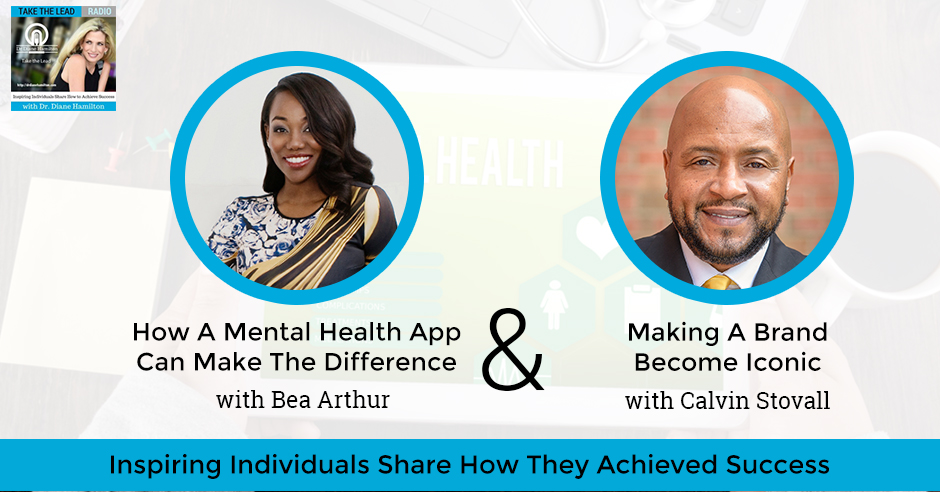
We have Bea Arthur and Calvin Stovall here. Bea Arthur did a TEDx Talk and she’s also a licensed therapist leading the modern mental health movement. Calvin is a CEO, Chief Experience Officer, for ICONIC Presentations. These two are going to be fascinating. I’m looking forward to talking to them.
Listen to the podcast here
How A Mental Health App Can Make The Difference with Bea Arthur
I am here with Bea Arthur who is a licensed therapist and entrepreneur who is leading the modern mental health movement. She has a TEDx Talk. She has been featured about everywhere. She’s a regular contributor to Forbes and Fox & Friends. She’s the first African-American woman to be accepted into the prestigious Y Combinator Accelerator Program. It’s nice to have you here, Bea.
Thank you, Diane. It’s nice to be here.
I’ve watched your TED Talk and I had to laugh when you came out and you go, “Yes, that’s my real name.” How confusing is it to have Bea Arthur as your name when that’s such a popular name?
I got lucky because undoubtedly my parents would have named me Christina. I would have had a different life. My family comes from Ghana in West Africa. I’m not named for her. This isn’t a tribute at all. My parents are from the village. It’s not like Maude was their favorite show. If they did have a TV, they weren’t watching Maude. The Golden Girls came out a couple of years after I was born. It was a happy accident. People tell me trivia about her all the time. Somebody once told me that she didn’t have a walk on the Hollywood Walk of Fame. I’m going to get that for both of us.
It’s interesting to look at what you’ve done. I looked at a couple of things about your work. The mental health movement that you’re leading is an interesting way to start. How did you get to this point? What’s your background?
Psychology is my favorite thing. My career took off at the intersection of psychology and technology. Psychology has been first. I’ve been doing that for many years. It happened like most great things in my life by accident. I did a lot of my undergrad years in Europe and my last semester of University was in London. I thought I’d stay there but they kicked me out because I couldn’t get my visa. I’m originally from Texas so I said, “I’m going to go to New York and make it work there.” I always tell people New York is the perfect place to be in your twenties because you couldn’t do anything. If you’re not sure what you want to do, you’re going to try out a lot of things. That was my first year in New York. I was ambitious. I had a lot of skills, but I didn’t know what to do so I crashed and burned a lot. I was in several different industries. I was a personal trainer. I worked for Bloomberg. I worked in art galleries. My last work before I went back to school was in real estate. I worked in real estate with new development, which is buildings that haven’t been built yet. The buyers only get a floor plan, a mock kitchen or a mock bedroom. You are selling people dreams.
I was 21. I didn’t care that much about commissions. I’m naturally nosy because I’m African. When people were making the decisions and talking through all their options, I would talk less about the specifics of the building and more be like, “You think you can have kids with her? You want to stay with him?” It’s such an emotional decision because usually people’s parents’ money is involved. People will tell me things and whether or not they ended up going with the apartment, I would get lots of referrals to people to think through what they wanted to do. Finally, one of my clients told me, “You’re good at getting people to tell you things. You should be a therapist.” I tried many different industries and careers. This was a light. It happened one of our agents was doing her Master’s in Psychology at Columbia. I shadowed one class. It was the only school applied to and I got in. That was the beginning. That was it. It was a happy accident.
That’s an impressive place to get in. I was listening to some of the things we had in common. I’m always interested in new things, psychology, tech and business space. I worked in real estate and I’m looking at some of the stuff that you’ve done. I’m naturally nosy as well. That ties into my research on curiosity. I’m fascinated by people like you who you say it’s from being African. Is it your background? Is it your family? What kept you curious that didn’t kill it in you and it does in other people? Did you have a supportive family?
My family is very close. I’m one of five kids. Not just Africans but I will say all immigrant populations make it clear from day one that we left everything we care about to make it work. Both of my parents are entrepreneurs. We have personal care homes which are like nursing homes but in private homes. My mom started that at age twelve. She had come from Ghana and was babysitting, enduring security and had no experience in healthcare. She heard it was a good business. Her and my dad made it happen. When she was starting, she didn’t have a first client for a few months. My mom had to be the one who was on-site because of all the regulations when it comes to healthcare. What I learned from that is not to romanticize the entrepreneurial journey. We’ve got a lot of pop charts all at once. We thought it was great because we started to buy our lunch instead of my mom making lunch. The thing that kept me going in this lifestyle is because I didn’t have this glorified idea, “We’re going to be ramen rich and we’re going to be building.” I had a long-tailed vision for what it takes to get there.
[bctt tweet=”Most great things in life happen by accident.” username=””]My parents are still business all these years later. The fact my parents have how to find a way of mentality, especially my dad. My dad had to get his doctorate twice when he came from Ghana in 1980s Texas. I was born and raised in Houston. It’s a diverse place because of all the medicine and the oil industry. In 1986, as they told my dad to his face, “We hire you but you’re black and you have an accent.” Now they have the Equal Opportunity Act. There were real obstacles back then, not that there aren’t now. The whole point is you don’t complain about them. You always find a way. In places like Ghana where there’s no infrastructure, you could create an LLC and nothing happens. You’re born into finding a workaround. That’s where my head’s always been out in my approach.
I saw Rice University in Houston. I was invited to go and check out their leadership program. I loved it there. It was pretty with all the trees and the beautiful campus. It’s my first time I’ve been to Houston. I have a lot of people that I know who have come from other countries, their families at least and they’re the first generation the parents usually. For some reason you get that, “We’ve got to make it work,” mentality. That’s the key to a lot of people’s success. I’m very interested in watching what’s going to happen with your new tool, The Difference. We’re going to say it’s provided in the Echo. I’m a big fan of learning things through her. In the morning my husband and I play Jeopardy every morning. There are many things you can do on these devices to make you smarter and make you better. I’m curious about the technology that you developed with the Echo in its use. It’s the first mental health app skill. Can you tell me more about it?
It’s called The Difference, my new business. It’s my third business in many years. I called it that because I believe as a therapist the right talk at the right time can make all the difference. We have designed Amazon’s first on-demand Alexa Skill. I’m going to call her Alicia because she is mad nosy like me. I figure people talk to Alicia. People talk to a therapist. It was this perfect Venn diagram of opportunity. When I talk about leading the modern mental health movement, I’m grateful. I feel urgent about the fact that the stigma is going away. We’re finally at a place in this country and globally that mental illness is something that we avoid talking about. I feel people are finally ready to start talking about it. We’re past that time because we need to start fixing it. There’s not a lot of transparency about what therapy is and whom it’s for. I especially hate the stats when people say, “One out of every five Americans suffered from mental illness.” The truth is 100% of people experience some mental health condition.
I feel like a therapist, there’s a big difference between having true clinical hormonal depression and just being depressed. I feel as a culture, we need to do better about talking about bad things. That’s where the stigma is. What is mental health? What is therapy? It’s two people talking in a room. We’re practitioners like everybody else who treats our client. The stigma is with what prompts you to go to a therapist? The fact you’re struggling with something, the fact that you don’t know how to do something. Admitting that you’re not in control and you’re not killing it. I feel, as a result, the life coaching mindfulness movement has cannibalized our industry and taken over. I hate that those are the only two options like medication or meditation. When what makes people feel better in the heat of the moment is talking to someone. Having somebody hear you and say, “You’re not crazy, that’s normal to me. You’re going to make it through this. Here’s what you can do next.” The world would be a happier, healthier place. That’s the thing I care about the most.
I get asked for a therapist recommendation every single day, including the weekends. I feel the real hurdle in our industry is the access. When you get started you have to cold call everybody on your insurance roster. Sometimes you don’t have insurance. Truthfully, a lot of good therapists don’t take insurance because they don’t have to. I don’t. Dealing with insurance is such a nightmare. It’s opaque. I want to make it that anybody, anywhere in the world can connect with a live human therapist within 30 minutes or less. That’s what we’re doing. We built a backend, that’s a call message queue. You prepay for minutes and it’s cheap. You’ll be able to go, “Alexa, I’m homesick. Alexa, where do I hide the body?” She’ll go, “Don’t worry. I got you.” It puts you in a queue to talk to one of our therapists. I staffed a bunch of therapists on our backend. We’ll go, “It will be twenty minutes or less. Here’s a meditation, bike home, headspace or listen to this song.” You can even leave a message to tell your therapist exactly what you want to talk about. That way there’s no small talk when she calls you. It’s instant expert access.
I’m thinking HIPAA, I’m thinking a few things here. I was a pharmaceutical representative and my husband is a doctor. I’m interested in how this works. You have to worry about HIPAA. No one else is in the room, but they’re still collecting and listening. People are worried about some of the privacy issues. Is there any issue with that?
I’ve been working on this since January 2018. This is my business baby. We gave birth to it for the beta. Originally, I liked the idea of facilitating the session through the speaker. I like the idea of hands-free support. Our first two markets that we’re targeting are new parents and people who work from home. Those two populations are often lonely and overwhelmed. I like the idea of being like, “Help me, Alexa,” then I realize with all the issues going on with surveillance and tech ethics. There would be too many people who wouldn’t trust it. Alexa’s the front door. We reroute you. You enter your phone number when they call you. We put you in the queue, that’s it.

Be Iconic: When you are faced with obstacles, don’t complain about them; instead, find a way.
I’ll start with asking through the device but then you reroute. I wonder if we’re going see more of that. What are they doing for medical advice and not just psychological advice? Is this something that we’re going to see more of in the whole medical field?
I hope so. It solves a bunch of useful problems when you’re in your home, especially with the Google Home speakers. They do a lot to take into context of everything. They already have ones for veterinarians. In the same way their software as a service, we’re trying to prove that skill is a service. Since I’ve been working with Amazon, they tell me, “There are a lot of issues with skills being transactional.” The Jeopardy ones, the gaming ones do well. For the most part, people just say, “What’s the weather? Set the timer.” It’s conversational AI. They want to demonstrate the conversation. Since therapy by design is an ongoing conversation, it made sense for them. We are a skill in Alexa’s world. It’s like how when apps first came out, they’re an app in the Apple Store, not necessarily an Amazon product.
We get around a lot of the BAA agreements because we don’t record anything. We no longer facilitate the session to the speaker. We call you on your phone. On our backend, we don’t record anything. Even at the beginning of every conversation, we say, “This conversation is not being recorded for privacy assurance.” It’s a customer service line for your life. That is how I like to think about it, but it’s powered by Alexa. They’re our first contact. It’s not the only way you can access the service. After the beta, you’ll be able to call 262-PEPTALK and have the exact same experience. It’s cheaper if you access The Difference through Alexa. You know how Amazon about Wholefoods and your groceries are cheaper when you use Prime? It’s like that.
Is it like Uber where the insurance and all that is up to the doctors, the physicians or the providers? You’re more of a service. You’re not having the overhead involved. Is it up to the therapist to make sure that they’re handling all that? If somebody should happen to hurt themselves or something happens because of it, are you liable or is it not that way?
We have business insurance and we also have group practice insurance. I consider all my therapists as trainers. I don’t like the term mental health even though it’s part of my title. It often gets conflated with mental illness and there’s a big difference. I like to say mental strength. I think of my therapists as mental strength trainers, but they all are therapists. They all are licensed therapists. They all do have independent malpractice insurance and they have old insurance as well. The difference with this is this is more for people who want therapy, not people who need therapy. If there’s any suicidal ideation, alcohol or chemical dependence or any true personality disorders, we refer out because we can’t be there in case of crisis.
This is more professional pep talks like, “Help me so that I don’t cuss out my husband. Help me so I don’t cuss out my boss. I need somebody to tell me it’s going to be all right,” that thing. We do have ongoing subscriptions as well. We don’t take insurance. That’s where a lot of the regulation and the documentation. We don’t want to keep any records on our site. Nothing could be hacked, no conversations, no notes. We do provide invoices for reimbursement, but even then they’re general diagnoses. That’s what I realized. Most people come to me. It’s just life transition changes that are causing conflict in their lives. With real things like borderline personality or those things, we refer out. All of our therapists are trained to screen for that.
[bctt tweet=”If you’re not sure what you want to do, you’re going to try out a lot of things.” username=””]There are no prescriptions? There’s none of that involved?
It’s just talking therapy.
It’s interesting to see how the medical fields changed since I was in pharmaceutical sales. A lot of it’s becoming more virtual. I know they started to change the detailed sales presentation, doing those virtually and now doctors sometimes are doing virtual things. I see doctors have patients, “Send me a picture of your scar or wound. How’s does it look?” It’s amazing how everything’s changed. I could see how the Echo device could incorporate many different ways to connect people in the medical field and other ways. It ties into some of the stuff that I was watching on your TED Talk. When you’re talking about how people have this FOMO and we’re trying to keep up with things. Is it a problem that we’re getting to need to talk to more people because of technology and yet using technology to fix the problem? It’s an interesting way to look at it.
I feel strongly about this, but technology has helped a lot of things especially as far as connectivity. My family is from Africa. I know lots of people in Africa who use Facebook. They might live in the bush but they still have those smartphones and still have connectivity. Especially for people with disabilities, it’s been great as far as fostering community. However, because human nature is flawed, our online nature is flawed as well. It has accelerated some of those problems and introduced new ones. What I mentioned in the talk is something I definitely see and it’s not just with Millennials. It’s not just with Gen Z. Every single age category reports anxiety and depression have gone up. It is undoubtedly due to the hyper-connectivity and the increased isolation that social media fosters. You get the constant connectivity but without intimacy. It’s what’s necessary for us to feel safe, loved and secure. You get people projecting. Are you an only child? I have a philosophy about it.
I’m the youngest.
This is no shade towards any only children. Some of my best friends are only children. What you do see especially from a side perspective growing up. If they are raised around almost the adults, what you see is that they just say things. When you don’t have big sisters or older sisters, there’s no one to be like, “That’s not true or that’s not dumb. Say more about that.” They don’t get to engage in a conversation. You get a lot of one-way conversations. In the same way, social media taught people to be like that. They just say things and then people like it. Even if you do challenge people, you can mute them, you could block them. Your friends jump in. There’s no real communication.
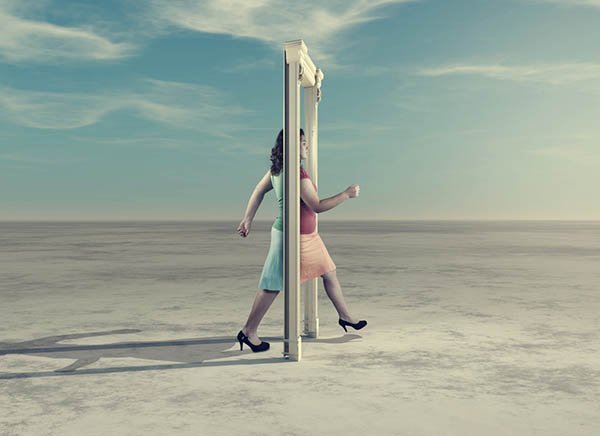
Be Iconic: Life’s transitions or changes tend to cause conflict in our lives.
I met a lot of Gen Z kids who introduced themselves that way or uncomfortable or unfamiliar with decent basic interpersonal communication. They don’t know how to engage without just announcing things. Even when you have lots of followers or lots of friends, that makes people feel lonely. Even with the illusion of all these connections. I definitely think that it can mess with your mind. Humans are tribal animals. We’re meant to rely on each other and need each other. We’re not using that resource enough. That’s what I want everybody to have.
It’s a fascinating look at how people communicate and what we communicate. We make things look one way. The fact that people need to say #nofilter or whatever it is. This time I’m going, to be honest with you.
With a very special announcement like, “I’ve been struggling with this.” It’s like when we were growing up. Different Strokes would have a special episode. We interrupt your regularly scheduled program of all my selfies to be like, “I’m having a tough day.”
It’s such a different time. It’s going to be challenging. What do you think Gen Z is going to be? How do you see them differently than the millennials in terms of mental abilities to communicate or anything else that you found?
It’s a double-edged sword. They have found themselves earlier. You see the younger kids not necessarily coming out as much. It’s not something they have to think about as much. They don’t have to identify as a certain way. It’s because of the rise of nano influencers. When I was growing up, you could slap Angelina Jolie or Brad Pitt on anything and it would sell. Now, it’s literally anything and everybody likes it. Julia Roberts, everybody will see it. There were certain gatekeepers in our society, entertainment, media and journalism. Now on Instagram there are these amazing comedians doing their thing. There are these amazing influencers that normally wouldn’t have been able to get a platform. What you see is kids finding their tribe earlier, even if they’re the only gay kid at their school, the only black kid at their school, the only weirdo at their school. They’ll still have people who like them. That does much for how we identify, how we treat other people.
Yes, they are lonelier. Yes, there are definitely some communication issues. They don’t have the same professional trajectory as we did. As much as people are advocating for free college, I don’t think college is going to exist in the same way in twenty to 30 years. An undergrad degree has never been worth $200,000. The fact that kids are learning to code earlier and there are all these different technical trade schools, that’s good for everyone. Finding your way quicker, not going by these rules that set people up for failure, “I don’t have a mortgage. I don’t have a husband and I’m way happier than people I know with a mortgage and a husband.” I feel it’s good to find your own way rather than aligning with this profile that’s been fed out to people. It’s finding your own way to be happy and meaningful in the world.
I agree on the education front. We’re going to see more bits and pieces of people learning knowledge in smaller bits than maybe necessarily four years or the way it’s been. People want instantaneous information. Right now, organizations still value the degree programs. We still have a lot of Boomers. We still have a lot of Gen Xers, the people who value that. As time goes on, you’re going to have more millennials and the Z group in general, like to get information in different ways. What you’re doing here is a different way to receive information in a way that fits the time. I’ve only had my Echo for a couple of years, how long it’s been out. What was it like before? I could ask her what time it was. She can calculate my student scores without me looking for my calculator. Whatever it is that we start to use these devices for. I get a lot of people who are worried about privacy concerns and people listening all the time. That brings up the cameras that some of these things are starting to have that are watching.
I don’t know why they would do that.
[bctt tweet=”Humans are tribal animals. We’re meant to rely on and need each other.” username=””]The cameras are not my biggest fan when it comes to me working when I’m not wanting to have somebody see me. Somebody called me on Facebook and I’ve never had anybody do that on the phone to Facebook. It turned my camera right on. I’m like, “That’s not good. I don’t want that.”
They need to slow the rule a little bit.
I’m a fan of technology and tying in the psychology, the tech, the business, you do all of the things that interest me. I was looking forward to having you on the show. I’m glad we got a chance to find out more about The Difference, your health skill. A lot of people want to know how they can find out more about you and get that app or skill if it’s available. If you can share those links, that would be great.
My name is Bea Arthur and you can find me on Twitter at @BeaArthurLMHC, that’s licensed mental health counselor. You can follow The Difference at TheDifference.co. Our Twitter handle is @TheDifferenceAI. We are in closed beta. In January 2019, we’re doing our full announcement and hopefully, this is when it’s live. Anybody will be able to access it as long as they have an Amazon Echo or show or thoughts. Please follow us. Sign up for the beta to be one of our earlier users on the TheDifference.co. Thank you so much, Diane. This has been lovely.
It has been fun. Thank you so much.
Making A Brand Become Iconic with Calvin Stovall
I am here with Calvin Stovall who is the CEO of ICONIC Presentations. He specializes in delivering high energy customized keynote presentations for organizations that desire to reach or maintain ICONIC status. It’s nice to have you here, Calvin.
I’m excited to be here, Diane. Thank you for having me.
Thank you for being here. I’m interested and I love the ICONIC Presentations idea. I want to know how you define iconic. I would like to get a background on you. How did you get to this level of success?
To try to sum things up, I’ve grown up in the hospitality industry. I have many years of hospitality experience. I started as a desk clerk at a Holiday Inn in Downtown Chicago. I’ve been in the industry at some form for another since then. I cut my teeth a lot at the Hilton Worldwide. I was the Vice President of Brand Marketing for Homewood Suites by Hilton. I helped grow that brand when I started. They had about 35 hotels and I played an integral role with my team to get that brand up and going. I learned a lot from that experience. I’ve also worked at St. Jude Children’s Research Hospital a couple of years in brand strategy. I also was a CEO of a nonprofit called the Soulsville Foundation, which was built on the legacy of Stax Records. It’s an iconic soul recording studio, which had The Staple Singers, Isaac Hayes, Sam & Dave.
When they closed in ‘74, they wanted to revitalize the neighborhood. They built a charter school on their campus. They have an after-school music program for at-risk youth and also The Museum of American Soul Music is all right there on their campus. I served as the CEO for that organization for a couple of years as well. During all of those years, I’ve always had a passion for speaking. I love customers. I love customer experience. It’s natural for me to evolve to where I am now. I have a huge passion for helping and inspiring people to reach this ICONIC status. It’s been a wonderful journey.
Do you have a passion for singing too?
No. You don’t want me to do that.
My first job was in a hotel as an operator. I’ve worked at a front desk. The 3:00 to 11:00 shift is brutal when you got to come back for the 6:00 to 2:00 AM next morning shift.
I’ve been on every shift, the 7:00 to 3:00, the 3:00 to 11:00 and the night audit. I’ve done it all.
They’re brutal. That was an interesting first stop though. It’s funny that we have that in common. I loved that you worked with St. Jude. It’s one of the charities I’ve embraced. Was it Danny Thomas who started St. Jude?
He sure did in 1962. It’s a fabulous organization. They’re almost up to $1 billion in fundraising. Probably surpassed that at this point but they do a wonderful job. They do some great work for all those beautiful children. I was honored to get an opportunity to work with them for the time that I did.
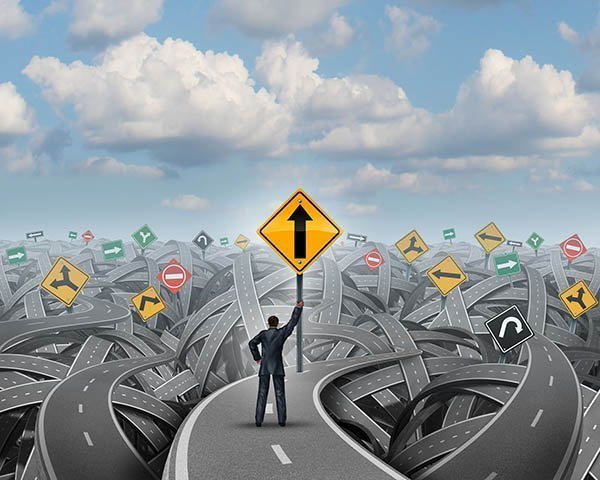
Be Iconic: Find your own way rather than aligning with a profile that’s been fed out to people.
That’s by far the one that I was drawn to of all the charities with which I deal with. What they do for those children is amazing. You have quite an interesting background and that’s what drew me to your profile. I like all the combination of things that you’ve done. I love the ICONIC Presentations idea about being an enthusiast and all positive words. How do you define ICONIC status? That’s subjective and I’m curious how you do it?
When I think of iconic a lot of people would think of brands that they know that are out there. The ones that I’ve worked for in the past like the Coca-Colas, the Nikes, I do think those are iconic and I’m sure all of your readers will agree with me. To me, I believe iconic is about doing certain things to have longevity for your brand or your company. Being able to stay relevant and being out there for a length of time. I believe regardless of size or location or where you are, I believe you can be iconic. A lot of people think in order to be iconic you have to have a great logo, a huge ad budget, and all these other things. I do think those things are important. You can have the best logo in the world. If you don’t have a real purpose with people who can rally around, you’re not connected to your customer, you have poor leadership or even more important you take your eyes off what’s going on around you. Your company is not going to last, particularly in this competitive environment that we’re in now. My iconic is about brand longevity. I believe any company can do that with the right steps and knowing the right formula.
It ties into the research idea from my book that’s coming out on curiosity. I was looking at some of the brands that have failed. We always hear the Blockbuster and Kodak examples. For longevity, a lot of it ties into innovation. That’s why I was working on developing curiosity in people. I believe it comes back to engagement, innovation and all the issues that people are having problems with. Do you find that people are being held back? Let me tell you the four things I found that hold people back from being curious are fear, assumptions, technology, and environment. I’m wondering how much you run into those issues holding people back from being iconic in their status? How big of a factor are fear or environment and some of those that I mentioned?
[bctt tweet=”If you’re truly telling a story from your heart that you feel, it’ll come across that way.” username=””]It’s component of all of those things. It depends on which lever people focus on. I’ve come up with these four Ps of what I call Iconicity. The four Ps are purpose, you’ve got to have a purpose. The second one is people. The third one is passion. The last one is perseverance, which is about that constant curiosity and never becoming complacent. I believe you always got to be looking for ways to stay relevant and through the experience for customers that you serve. I like to say, “You don’t want your company to get Uberized or Airbnb’d. You don’t want to get caught off guard.” Of those Ps, to be iconic to me, I believe you have to do all four. You need the people. Definitely, you want to make sure that you’re connected to your customers. You want to make sure that you understand your customer’s journey. You’ve got to also be able to walk in their shoes. That takes a certain level of empathy and the passion has to be there.
I like to say, “You’ve got to own it, live it and love it.” If you’re a leader in an organization, you’ve got to lead with passion, vitality and getting the people around you fired up to take care of the customer. If the leadership isn’t in the game, trust me your people won’t be either. It all stems from the first P, which is purpose. What do you stand for and what makes you different? Companies like IKEA, Whole Foods, Starbucks, Chick-fil-A, those guys understand how powerful purpose can be. Getting your people rallied around something beyond making money is what helps make you become iconic. You’ve got to do all four. If you are not doing all four, there’s going to be a gap there. You could definitely put your brand in jeopardy all the time.
You brought up empathy which is an interesting discussion since I wrote my dissertation on emotional intelligence. I’m fascinated by all the components of it. Empathy is a big factor. They’ve done a lot of training in organizations to at least test to see how people’s emotional intelligence levels and different things. Do you think that we’re seeing a lot of improvements in empathy? Do you think there’s room for improvement?
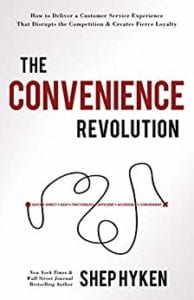
The Convenience Revolution: How to Deliver a Customer Service Experience that Disrupts the Competition and Creates Fierce Loyalty
I personally believe there is room for improvement. There’s this research out there that shows that 80% of companies say they deliver a good customer experience, but only 8% of customers agree. There is a huge significant gap there. I believe the leadership in a lot of organizations, they’re a little delusional and disconnected from reality. I believe the C-suite has to care about the customer in order to have a customer-centric organization. The only way you can do that is to understand what the customer is going through. Are you easy to do business with? Shep Hyken has a book called The Convenience Revolution. All those things help create that level of ease for a customer to do work with you. The only way that’s going to happen is if you have empathy for that customer. Make sure you walk them through all the steps that they take, all of the interactions that they have with your company and truly understand them. A lot of organizations miss that point.
Shep was on my show and he has a great book. He’s good at what you’re good at, which is storytelling. Storytelling is a tough thing to learn to do for some people. Being in sales for many decades, that was what they trained us. A lot of it was you wanted to paint a picture in your customers’ minds so that you can feel their pain or whatever. How do you help these people to become better storytellers? That’s a challenge, don’t you think?
It is a challenge. It comes from authenticity. All of us are going to restaurants, hotels and having experiences in our day-to-day lives. I try to capture all of those moments. If you’re truly telling a story from your heart that you feel, it’ll come across that way. You can’t tell a story as somebody else told it. It has to come from your soul. For example, how I thought with this whole iconic thing. I went to a restaurant called Al’s Breakfast in Minneapolis. This just made it. It solidified for me. I live in Minneapolis for a few years. This restaurant is in Dinkytown right near the University of Minnesota. All of the locals there say, “You need to go to Al’s Breakfast. Go to Al’s Breakfast.” In my mind, I had a different picture of a restaurant. When I get there, I see a line going down the block. This little-bitty restaurant that’s stuck in between two buildings in the alleyway. When you get in, the place could’ve been more than ten feet wide. It’s about the size of a railroad car. They have fourteen stools in there. There’s one long linoleum counter in the middle. That place was packed.
There was energy. The ambiance was fantastic in there. People come there all the time. They stand in those lines. What I thought was fascinating was that the patrons that go there all the time. If they have a group of people standing in line and they wanted to sit together, the people will move down the counter. What it proved to me is that whole thing about iconic is in the customer’s mind and what they think you are. A lot of companies say, “I’m great,” but it’s what the customer thinks. Those people love that place. That solidifies anybody can be iconic. Stories like that, when you’re going to different places, capture those things. When you’re trying to get a point across, share it because people love stories and they stick in people’s minds.
[bctt tweet=”You can’t tell a story as somebody else told it.” username=””]It reminds me of a restaurant that was similar when I used to fly into Delaware. I worked for AstraZeneca for many years. We used to fly into Philadelphia. There was a place called DiNardo’s. It was a crab restaurant that was like that. You couldn’t get in it. It was this little place where people are smashing crabs with their hammers.
You remember that though. You can go to many places now. The world of customer service has a lot of challenges. What I’m talking about is a little bit different. You have to be above average. To be above average, you’ve got to do something to try to get the customer to remember you. There are many options out here. You want to be the top choice. You don’t want to be in the middle somewhere where people may or may not come. I believe that to be able to do that, it has to be something memorable for the customer. The power of social media is so huge, you want them to go out and put a review or talk about you. Tell their friends, relatives or colleagues about the experience that they had. That’s what drives people to come and try your establishments. They’re listening to their friends and colleagues and social. It’s not much about TV ads anymore.
It’s such an interesting concept of how word of mouth has changed. I’ve shared this with my students many times. On the outside of this little restaurant was a sign that somebody had written chalk on the chalkboard and said, “Come in and try the worst cup of coffee that anyone’s ever had.” It was a funny play of what had happened on Yelp trying to combat the problem experience. Some people handle it that way. There are some major things that will happen if you have a bad review or if something catches the attention of the airlines or Starbucks. Different things that have happened that have been serious issues that captured attention. What do you think of how Starbucks handled their scandal where they arrested the two gentlemen?
I thought they did a pretty good job. They could have moved a little bit faster. When something like that with a crisis, there are many surprises and things happen unexpectedly. Sometimes you’re scrambling trying to figure out the right position. Since we’re not sitting in their seats, we’re trying to figure it out for them. It’s tough. If you move too fast, you might even make it worse. If you move too slowly, people are like, “What’s going on?” Doing the sensitive training and things of that nature was the best way to approach it. Hopefully, it won’t happen again. Starbucks is one of those iconic brands. They were given some forgiveness because of what they’ve always done in the community. Sometimes things happen. You have to rebound from them. I know they’ve learned a lesson from it and you have to continue to make sure you keep your people trained and things of that nature so it doesn’t happen again.
[bctt tweet=”It takes a certain level of empathy and compassion to be able to walk in someone else’s shoes.” username=””]I’ve been seeing a lot of crisis readiness training. A lot of speakers are going that way and some are excellent. On my show, Melissa Agnes has done a nice job in that area. It’s good to see more proactive thinking and we’re seeing more of that. Brands can be easily impacted. I don’t think that we used to see that as much because we didn’t have a social media problem, as far as spreading word of mouth fast. One of the biggest challenges I found when I was writing a brand publishing course with Forbes when I was the MBA Program Chair Forbes School of Business. I’d go to the CMO Conferences and talk to some of these leaders. They would say that the problem they’re having is reaching people at scale and still making the message feel personalized. Are you working with smaller companies, larger companies? Are you seeing the same issues with them trying to get their message out? Is scale an issue that comes up?
It does. I worked even with small companies, even large ones. There is a challenge out there trying to find that perfect balance between the technology and the human connection part of it. All of the technology and the things that they’re doing have its place. I believe it could become too technology-heavy. Your brain doesn’t feel it’s human or I’ll have a more personalized experience. Hilton is doing a great job moving in that direction trying to personalize your experience, helping you picks your own room and things of that nature. That is a big challenge. I’m working with another company that does siding. That whole communication thing is huge for them. They’re trying to figure out how to best communicate with a customer when the expectation is not met. The demand is high for people getting sidings in their homes. They’ll think something’s going to be done at this time but it’s not. Trying to communicate with a customer and making sure you manage that expectation, where they don’t feel you’ve let them down. It’s a challenge to be able to do that. Trying to help them come up with solutions, using texting, trying to use email. People are so busy. There are so many messages, so many emails. It’s hard to break through a lot of it. It’s a lot of clutter out there to try to get your brand focused on where people can know what you’re about and what you’re trying to accomplish.
You talk about all the things. You do keynotes customized to their needs and stuff. You talk about storytelling when you deliver your presentations. What about the music themes? What do you do with that?
I use music in several places. Particularly I talk about because there are also musicians that I also consider iconic like the Elton Johns, the Bruce Springsteens of the world, even LL Cool J. They’ve been able to keep themselves relevant for years, for decades on down. I do something particularly towards the end. I do something called one-hit wonders in my keynotes. What I do is talk about the importance of you don’t want to be a one-hit wonder. You want to keep on making hits for your customers consistently over and over again. What I do is I place some one-hit wonder songs in the keynote. I play those and let people guess who they are. I blend that in. I do a little James Brown stuff. I’ll make it fun. In some cases, if I can get them up, if I get people to be brave enough, sometimes I’ll even add up a little Soul Train line at the end. It’s fun. I try to keep the content relevant and people walk away with some tools that they can use immediately when they get back to their office. I want to make it entertaining and fun too. It’s challenging to sit in front of a person for an hour or an hour and a half. It’s tough. People are distracted easily. You want to make sure that you keep them engaged.
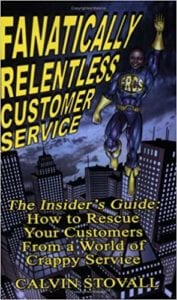
Fanatically Relentless Customer Service — The Insiders Guide: How to Rescue Your Customers from a World of Crappy Service
Music’s great. Some companies do a good job of incorporating music into the meetings I’ve been to. I went to one and we still talk about it. Do you know the song Magic from the ‘70s? They didn’t play more than, just that much of it. It goes over that same phrase over and over for five days. Every time I hear that I want to pull my skin off. There’s a thing as too much of something. I could see why that would be a way to bring an audience to life. Sometimes you’re talking at people and I like involving people. What you do is important. The storytelling is important. Painting the picture of why they need to do this is key. I’m curious if people wanted to hire you to speak or wanted to find out more about what you’re doing, how do they find you?
I do have a website, www.ICONICPresentations.net. You could find me there.
This was fun. I enjoyed meeting you, Calvin. What’s next for you? Are you going to continue speaking? Are you writing?
Speaking is my lifeblood. I did write one book called Fanatically Relentless Customer Service but that was several years ago. I’m working on a new one now. It will involve music brands and customers. I found a way to blend it all and put it in a nice package. I’m hoping to have that come out hopefully 2019, probably towards the end of the year.
I’m looking forward to it. It was nice having you on the show. Thank you so much, Calvin.
Thank you, Dr. Diane. It is a pleasure.
You’re welcome.
—
I want to thank Bea and Calvin for being on the show. I enjoyed having our conversations. We have many great guests on this show. If you’re looking for more information about what we’re doing with the Curiosity Code Index or Cracking The Curiosity Code, it all can be found at CuriosityCode.com. We have aligned with SHRM to provide credits for recertification. We’re getting some movement. Some of these big organizations are showing a lot of interest. I am excited for it to be released. You can sign up to find out more at CuriosityCode.com. I hope you join us for the next episode of Take The Lead Radio.
Important Links:
- Bea Arthur
- TEDx Talk
- ICONIC Presentations
- The Difference
- @BeaArthurLMHC – Bea Arthur’s Twitter
- @TheDifferenceAI – The Difference Twitter
- Soulsville Foundation
- Stax Records
- The Convenience Revolution
- Shep Hkyen
- Melissa Agnes
- Fanatically Relentless Customer Service
About Bea Arthur
 Bea Arthur, LMHC is a Columbia University-trained psychotherapist, startup founder, and author who works with high-performance individuals in high-pressure work environments. Her career lives at the intersection of psychology and technology and her third company, The Difference, provides on-demand access to therapy as Amazon’s first mental health Alexa Skill. Additionally, Bea was the first African-American female founder in Y Combinator and was named an Entrepreneur to Bet On by Newsweek Magazine as well as one of Bumble’s 100 Most Inspirational New Yorkers. She is also an editorial contributor and host for ForbesWomen, where she hosts Office Hours, a career therapy digital series providing intra-praneurship advice to upwardly mobile women in today’s hottest companies.
Bea Arthur, LMHC is a Columbia University-trained psychotherapist, startup founder, and author who works with high-performance individuals in high-pressure work environments. Her career lives at the intersection of psychology and technology and her third company, The Difference, provides on-demand access to therapy as Amazon’s first mental health Alexa Skill. Additionally, Bea was the first African-American female founder in Y Combinator and was named an Entrepreneur to Bet On by Newsweek Magazine as well as one of Bumble’s 100 Most Inspirational New Yorkers. She is also an editorial contributor and host for ForbesWomen, where she hosts Office Hours, a career therapy digital series providing intra-praneurship advice to upwardly mobile women in today’s hottest companies.
About Calvin Stovall
 Calvin Stovall is the CEO, Chief Experience Officer and Iconicity Enthusiast for ICONIC Presentations, LLC. Calvin specializes in delivering high energy, customized keynote presentations for organizations that desire to reach or maintain ICONIC status. Calvin focuses on delivering the perfect blend of business concepts, story-telling and music themes to bring home an impactful message that touches both the heads and hearts of his audiences.
Calvin Stovall is the CEO, Chief Experience Officer and Iconicity Enthusiast for ICONIC Presentations, LLC. Calvin specializes in delivering high energy, customized keynote presentations for organizations that desire to reach or maintain ICONIC status. Calvin focuses on delivering the perfect blend of business concepts, story-telling and music themes to bring home an impactful message that touches both the heads and hearts of his audiences.

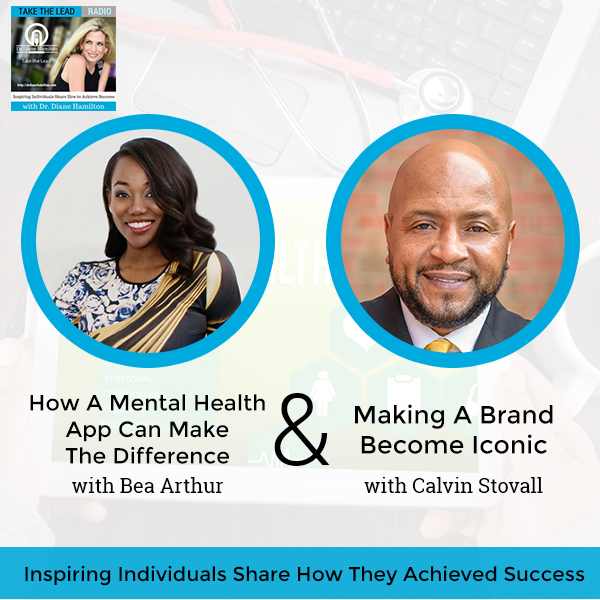

0 Comments